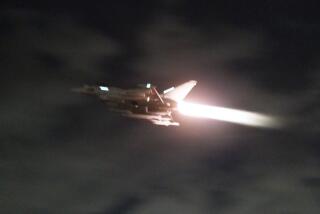Iraq Gives New Data on Ballistic Missile Program : Mideast: Baghdad scoffs at United States for sending troops to Jordan and Kuwait to avert perceived threat.
- Share via
BAGHDAD, Iraq — The Iraqi government Saturday gave the United Nations fresh data on its ballistic missile program and scoffed at Washington for sending troops to the Persian Gulf to forestall a perceived Iraqi threat to Jordan and Kuwait.
At the same time, comments by the press and officials in Jordan and Kuwait tended to support Iraq’s view that the United States was overreacting.
In Baghdad, Rolf Ekeus, head of the U.N. Special Commission disarming Iraq under the 1991 Gulf War cease-fire, said: “We have received new information on the missiles program, and we are now assessing that.”
The official Iraqi press launched fresh attacks on Washington, which has stepped up efforts to isolate Baghdad since two senior aides of President Saddam Hussein defected to Jordan earlier this month.
“America is acting with obvious hysteria. . . . It is dealing with Iraq like a desperate gambler who lost all bets,” the government paper Al Jumhuriyah said in an editorial.
The United States said Friday that it was moving forward joint exercises to discourage menacing moves by Iraq against Kuwait or Jordan. The maneuvers involving about 1,400 U.S. troops will start in Kuwait around the end of August, instead of late October or early November as had been planned.
In Jordan, 4,000 U.S. Marines and sailors are taking part in maneuvers with the Jordanian army launched Friday.
“It is absurd to talk about an Iraqi military action against Jordan. There is no justification for that,” Al Jumhuriyah said.
Lt. Gen. Hussein Kamel Majid, the brains behind Iraq’s military and civil industries, and his brother Saddam Kamel Majid, Saddam Hussein’s chief bodyguard, fled to Jordan Aug. 8. The two are sons-in-law and cousins of Hussein and have their wives and aides with them.
In Amman, a Jordanian official said Ekeus was expected in the Jordanian capital Monday to meet Hussein Kamel Majid.
But Jordan denied that it was being pressed by the United States to cut trade relations with Iraq. Jordan imports all its oil from Iraq and showed sympathy for Baghdad during the 1990-91 Gulf crisis triggered by Iraq’s invasion of Kuwait.
In Kuwait, press reports said Kuwaitis felt reassured by U.S. moves to bolster Gulf security but had no concrete evidence of any additional threat from Iraq, their former occupier.
More to Read
Sign up for Essential California
The most important California stories and recommendations in your inbox every morning.
You may occasionally receive promotional content from the Los Angeles Times.













